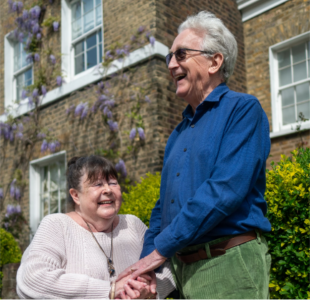Many caregivers are reaching a breaking point—and here’s why it’s so overlooked
- Replies 0
Theresa Wilbanks didn’t recognize the woman staring back at her in the mirror.
Two years into caring for her elderly father, her days had become a blur of doctor visits, daily hygiene routines, and endless emotional labor.
The anger, the resentment—it wasn’t just about being tired. It was about losing herself.
“I had become angry and resentful and burned out from prioritizing his well-being over mine,” Wilbanks recalls.
That moment would eventually lead her to write Navigating the Caregiver River, a guidebook to help others steer through the same treacherous waters.
Her story is one of many in a quiet epidemic sweeping through homes across America: caregiver burnout.
It doesn’t always begin with exhaustion. Sometimes it starts with forgetting things you normally wouldn’t.
Or snapping at a loved one, only to immediately feel regret. Sometimes it's emotional numbness that creeps in gradually, like fog settling over your life.

According to a 2023 AARP survey, nearly half of caregivers reported increased emotional stress, and over a third experienced physical strain.
Younger caregivers, especially those under 35, faced the most anxiety, while women reported greater emotional tolls than men. Four in ten said they rarely—if ever—feel at ease.
And this isn’t just being tired. This is burnout. It’s what happens when you’ve been sprinting for months—or years—without a finish line in sight.
Maybe it’s guilt. Maybe it’s pride. Maybe it’s both.
Former Wisconsin Governor Marty Schreiber cared for his wife, Elaine, during her battle with Alzheimer’s. For 18 years, he tried to do everything himself.
“That was one of my biggest mistakes,” he admits that he should have asked for help sooner.
Eventually, Schreiber began asking his daughters to help when they visited. He also leaned on friends to sit with Elaine, even just for a few hours.
It wasn’t about handing off responsibility. It was about survival.
There are tools available—CareCalendar, CaringBridge, Give InKind—that allow caregivers to schedule and coordinate support.
Area agencies on aging can also be lifelines, connecting caregivers to local resources.
But reaching out starts with one critical truth: You cannot do this alone.
Mary Lou Falcone didn’t see it coming. Her husband, Nicky Zann, was diagnosed with Lewy body dementia in 2020.
And like many, she tried to shoulder it all until she couldn’t anymore.
“I’m not a joiner by nature,” she says. “But joining a local Lewy body dementia support group was one of the best things I ever did.”
Support groups offer more than shared stories. They provide a mirror—a reflection of yourself in someone else’s experience—and a reminder that you're not the only one navigating this terrain.
Jerry Bishop, who’s been caregiving for his wife for over 30 years, calls these groups a “lifeline.”
He leads a chapter of the Well Spouse Association and says knowing you’re not alone “makes a huge difference.”
One of the hardest lessons Wilbanks learned was about limits. She started small—delegating errands, setting clear expectations with hired aides, even redefining dynamics with her brother.
It wasn’t about tension or conflict. It was about protecting her energy.
As psychologist Deborah Derrickson Kossmann puts it, “Caregivers need breaks. Recognize your own caregiving limits and be able to negotiate clearly with your support system for the assistance you need to help do the job.”
This means accepting your human limitations, being honest with family, and even carving out time for a walk, a coffee, or just five uninterrupted minutes of stillness.
Caregivers, like anyone under chronic stress, need release valves. For some, it’s meditation.
For others, it’s swearing into a pillow—no joke.
A 2022 study from Ulster University found that swearing, particularly in private, can actually help people regulate overwhelming emotions.
Falcone agrees: “As unconventional as it may seem, yelling the 'F' word into a pillow in private provides a release.”
If swearing’s not your thing, psychologist Martin Seligman’s “three good things” practice might be. At the end of each day, write down three positives—even if they’re small.
A good meal. A warm hug. A kind text. It’s not about ignoring the bad. It’s about reminding yourself of the good.
Here's the hard truth: caregiving can shorten your life. A 2018 study found that nearly 18% spousal caregivers for someone with Alzheimer’s died before their partner.
That means your well-being isn’t optional. It’s urgent.
Yes, burnout is real. But so is love. So is strength. So is your right to rest.
Read next:

What strategies have you found most helpful in managing stress or preventing burnout in your caregiving journey? Share your experience in the comments—your story could inspire others facing similar challenges!
Two years into caring for her elderly father, her days had become a blur of doctor visits, daily hygiene routines, and endless emotional labor.
The anger, the resentment—it wasn’t just about being tired. It was about losing herself.
“I had become angry and resentful and burned out from prioritizing his well-being over mine,” Wilbanks recalls.
That moment would eventually lead her to write Navigating the Caregiver River, a guidebook to help others steer through the same treacherous waters.
Her story is one of many in a quiet epidemic sweeping through homes across America: caregiver burnout.
It doesn’t always begin with exhaustion. Sometimes it starts with forgetting things you normally wouldn’t.
Or snapping at a loved one, only to immediately feel regret. Sometimes it's emotional numbness that creeps in gradually, like fog settling over your life.

Many caregivers are reaching a breaking point—and here’s why it’s so overlooked. Image source: Centre for Ageing Better / Unsplash
According to a 2023 AARP survey, nearly half of caregivers reported increased emotional stress, and over a third experienced physical strain.
Younger caregivers, especially those under 35, faced the most anxiety, while women reported greater emotional tolls than men. Four in ten said they rarely—if ever—feel at ease.
And this isn’t just being tired. This is burnout. It’s what happens when you’ve been sprinting for months—or years—without a finish line in sight.
Maybe it’s guilt. Maybe it’s pride. Maybe it’s both.
Former Wisconsin Governor Marty Schreiber cared for his wife, Elaine, during her battle with Alzheimer’s. For 18 years, he tried to do everything himself.
“That was one of my biggest mistakes,” he admits that he should have asked for help sooner.
Eventually, Schreiber began asking his daughters to help when they visited. He also leaned on friends to sit with Elaine, even just for a few hours.
It wasn’t about handing off responsibility. It was about survival.
There are tools available—CareCalendar, CaringBridge, Give InKind—that allow caregivers to schedule and coordinate support.
Area agencies on aging can also be lifelines, connecting caregivers to local resources.
But reaching out starts with one critical truth: You cannot do this alone.
Mary Lou Falcone didn’t see it coming. Her husband, Nicky Zann, was diagnosed with Lewy body dementia in 2020.
And like many, she tried to shoulder it all until she couldn’t anymore.
“I’m not a joiner by nature,” she says. “But joining a local Lewy body dementia support group was one of the best things I ever did.”
Support groups offer more than shared stories. They provide a mirror—a reflection of yourself in someone else’s experience—and a reminder that you're not the only one navigating this terrain.
Jerry Bishop, who’s been caregiving for his wife for over 30 years, calls these groups a “lifeline.”
He leads a chapter of the Well Spouse Association and says knowing you’re not alone “makes a huge difference.”
One of the hardest lessons Wilbanks learned was about limits. She started small—delegating errands, setting clear expectations with hired aides, even redefining dynamics with her brother.
It wasn’t about tension or conflict. It was about protecting her energy.
As psychologist Deborah Derrickson Kossmann puts it, “Caregivers need breaks. Recognize your own caregiving limits and be able to negotiate clearly with your support system for the assistance you need to help do the job.”
This means accepting your human limitations, being honest with family, and even carving out time for a walk, a coffee, or just five uninterrupted minutes of stillness.
Caregivers, like anyone under chronic stress, need release valves. For some, it’s meditation.
For others, it’s swearing into a pillow—no joke.
A 2022 study from Ulster University found that swearing, particularly in private, can actually help people regulate overwhelming emotions.
Falcone agrees: “As unconventional as it may seem, yelling the 'F' word into a pillow in private provides a release.”
If swearing’s not your thing, psychologist Martin Seligman’s “three good things” practice might be. At the end of each day, write down three positives—even if they’re small.
A good meal. A warm hug. A kind text. It’s not about ignoring the bad. It’s about reminding yourself of the good.
Here's the hard truth: caregiving can shorten your life. A 2018 study found that nearly 18% spousal caregivers for someone with Alzheimer’s died before their partner.
That means your well-being isn’t optional. It’s urgent.
Yes, burnout is real. But so is love. So is strength. So is your right to rest.
Read next:
- A caregiving crisis is growing across the US—here’s what families need to know now
- Are these health care providers facing a costly mistake? Here’s what they have to pay back now
Key Takeaways
- Caregiver burnout impacts both physical and emotional health, potentially causing depression, anxiety, weight changes, and weakened immunity.
- Delegating tasks and setting clear boundaries with family members are essential to prevent caregiver burnout and maintain personal well-being.
- Engaging in self-care practices like meditation, taking breaks, and joining support groups builds emotional resilience and helps caregivers cope.
- Releasing stress through healthy outlets and focusing on positive moments can improve caregivers’ overall mental health and sustain their caregiving role.





